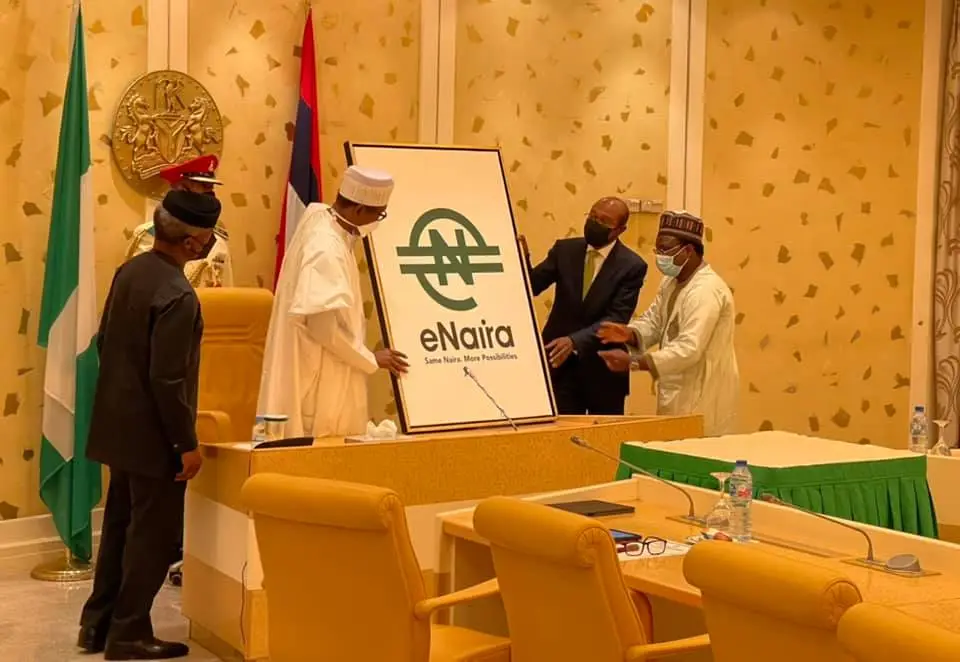Nigeria Becomes First African Country to Float Central Bank Digital Currency

Your Excellency, the Vice President, the Secretary to the Government of the Federation, the Chief of Staff to the President, Members of the Federal Executive Council, the Governor and Deputy Governors of the Central Bank, Heads of Relevant Agencies here present, members of the Press, Ladies and Gentlemen. I welcome you to today’s event, which is to officially launch our country’s Digital Currency, the eNaira.
Context
1. As we all know, money has been part of human history for at least the last 3,000 years in some way, shape or form. But over this period, its form has evolved to respond to the realities of the economy and the willingness of economic actors to synchronize money to the realities of life itself. This is why money has evolved through six identifiable stages including the Barter System, Commodity Money, Metallic Money, Paper Money, Credit Money, and Electronic Money.
2. In recent times, Your Excellencies, the use of physical cash in conducting business and making payments has been on the decline. This trend has been exacerbated by the onset of the COVID-19 pandemic and the resurgence of a new Digital Economy.
3. Alongside these developments, businesses, households, and other economic agents have sought for new means of making payments in the new circumstances.
4. The absence of a swift and effective solution to these requirements, as well as fears that Central Banks’ actions sometimes lead to hyperinflation created the space for non-government entities to establish new forms of “private currencies” that seemed to have gained popularity and acceptance across the world, including here in Nigeria.
5. In response to these developments, an overwhelming majority of Central Banks across the world have started to consider issuing digital currencies in order to cater for businesses and households seeking faster, safer, easier and cheaper means of payments.
6. A handful of countries including China, Bahamas, and Cambodia have already issued their own Central Bank Digital Currencies (or CBDCs). A 2021 survey of Central Banks around the world by the Bank for International Settlements (BIS) found that almost 90 percent are actively researching the potential for CBDCs, 60 percent were experimenting with the technology and 14 percent were deploying pilot projects.
7. Needless to add, close monitoring and close supervision will be necessary in the early stages if implementation to study the effect of eNaira on the economy as a whole.
8. It is on the basis of this that the Central Bank of Nigeria (CBN) sought and received my approval to explore issuing Nigeria’s own Central Bank Digital Currency, named the eNaira.
9. This move was underpinned by the fact that the CBN has been a leading innovator in the form of money they produce, and in the payment services they deploy for efficient transactions. They have invested heavily in creating a Payment System that is ranked in the top ten in the world and certainly the best in Africa. This payment system now provides high‐value and time‐critical payment services to financial institutions, and ultimately serves as the backbone for every electronic payment in Nigeria.
10. They have also supported several private‐sector initiatives to improve the existing payments landscape, and in turn, has created some of the world’s leading payment service providers today.
11. While the journey to create a digital currency for Nigeria began sometime in 2017, work intensified over the past several months with several brainstorming exercises, deployment of technical partners and advisers, collaboration with the Ministries of Communication and Digital Economy and its sister agencies like the Nigerian Communications Commission, integration of banking softwares across the country and painstaking tests to ensure the robustness, safety and scalability of the CBDC System.
12. Let me note that aside from the global trend to create Digital Currencies, we believe that there are Nigeria-specific benefits that cut across different sectors of, and concerns of the economy. The use of CBDCs can help move many more people and businesses from the informal into the formal sector, thereby increasing the tax base of the country.
13. Alongside digital innovations, CBDCs can foster economic growth through better economic activities. Indeed, some estimates indicate that the adoption of CBDC and its underlying technology, called blockchain, can increase Nigeria’s GDP by US$29 billion over the next 10 years.
14. CBDCs can also help increase remittances, foster cross border trade, improve financial inclusion, make Monetary Policy more effective, and enable the government to send direct payments to citizens eligible for specific welfare programmes.
15. It is on these basis that I am delighted to officially launch the Central Bank of Nigeria Digital Currency, called the eNaira, and in so doing, we have become the first country in Africa, and one of the first in the world to introduce a Digital Currency to her citizens.
16. Let me in closing commend the Governor of the Central Bank, his Deputies and the entire team of staff who worked tirelessly to make this day a reality. I thank you and may God bless the Federal Republic of Nigeria.
Muhammadu Buhari,
President, Commander-in-Chief of the Armed Forces Federal Republic of Nigeria.

